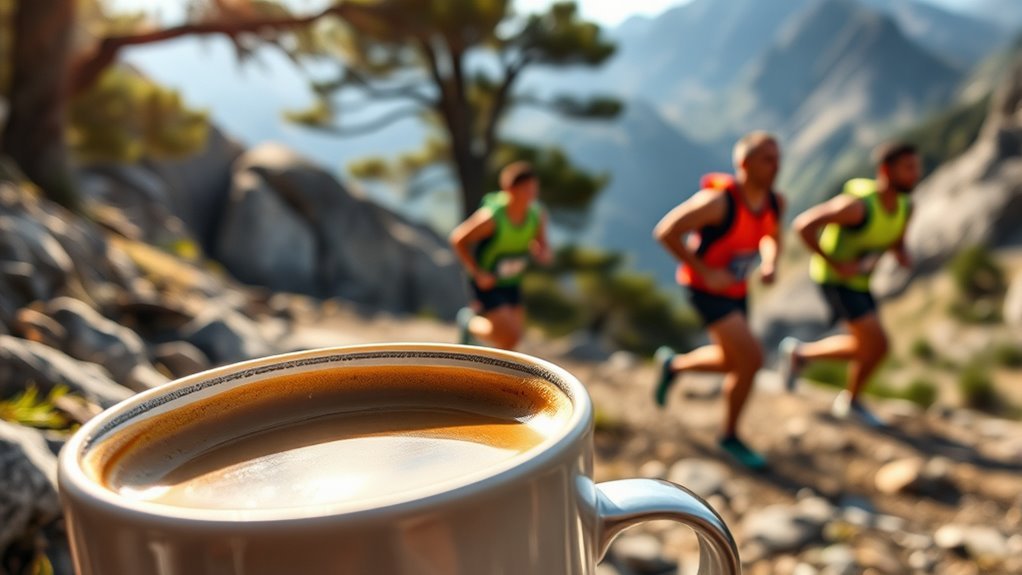The Benefits of Coffee for Ultra-Marathoners
Coffee offers ultra-marathoners significant advantages, enhancing endurance and recovery. Caffeine boosts alertness and encourages fat utilization for energy, preserving glycogen stores during long races. Timing your coffee intake, ideally 30-60 minutes before a race, can elevate performance. Additionally, coffee’s antioxidants help reduce inflammation, promoting muscle recovery. Integrating coffee into your hydration strategy supports both performance and focus. There’s more to explore about personalizing your coffee routine for ideal results and race experience.
The Science Behind Caffeine and Endurance

When you’re pushing your limits in an ultra-marathon, understanding the role of caffeine can greatly impact your performance. Caffeine metabolism is essential; it influences how your body breaks down and utilizes energy during prolonged exertion. When consumed, caffeine enhances the mobilization of fatty acids, allowing you to tap into your fat stores for fuel. This adaptation is critical for endurance, as it spares glycogen reserves, delaying fatigue. Additionally, caffeine can improve your focus and reduce perceived effort, making those grueling miles feel a bit easier. By strategically timing your caffeine intake, you can harness these endurance adaptations, ultimately enhancing your race experience. So, don’t underestimate the power of caffeine; it’s a tool for freedom in your ultra-marathon journey.
How Coffee Enhances Performance
Although many athletes rely on various supplements to enhance their performance, coffee stands out as a natural and effective option for ultra-marathoners. The key ingredient, caffeine, plays a significant role in stimulating your central nervous system, leading to increased alertness and reduced perceived effort during long runs. When consumed, coffee metabolism kicks in, allowing your body to use fat as a primary fuel source, thereby preserving glycogen stores. This is especially beneficial during extended endurance events. However, it’s essential to take into account your own caffeine sensitivity, as this can affect how your body reacts to coffee. Finding the right amount can enhance your performance, giving you that much-needed edge on race day without the drawbacks of synthetic supplements.
Timing Your Coffee Consumption

To maximize the benefits of coffee during your ultra-marathon, timing your consumption is essential. Consuming caffeine about 30 to 60 minutes before the race can enhance your performance, while a mid-race boost can help maintain your energy levels. Understanding when to drink coffee can make a significant difference in your overall endurance and focus.
Optimal Pre-Race Timing
Timing your coffee consumption before an ultra-marathon can considerably impact your performance, as the caffeine in coffee enhances endurance and focus. To optimize your pre-race rituals, consider these guidelines based on your caffeine sensitivity:
- Timing: Aim to drink coffee about 30-60 minutes before the race starts. This allows caffeine to peak in your bloodstream when you need it most.
- Amount: A moderate dose of 3-6 mg of caffeine per kilogram of body weight is typically effective. Adjust based on your personal tolerance.
- Practice: During training, experiment with your coffee timing to find what works best for you. Avoid surprises on race day.
Mid-Race Caffeine Boost
As you push through the grueling miles of an ultra-marathon, a mid-race caffeine boost can be a game-changer for maintaining your energy levels and mental sharpness. Timing your caffeine intake is vital; studies suggest consuming coffee around the halfway point can enhance performance. This is when fatigue sets in, and the stimulating effects of caffeine can help you regain focus and vigor. For ideal energy management, consider sipping on coffee or a caffeinated gel to avoid the crash that can occur with larger doses. By strategically planning your caffeine timing, you’ll harness its potential to elevate your endurance and keep your spirits high, allowing you to embrace the freedom of the open trail.
The Role of Antioxidants in Recovery
Antioxidants play an essential role in your recovery process after ultra-marathons by reducing inflammation and promoting muscle recovery. When you consume coffee, you’re not just getting a caffeine boost; you’re also benefiting from its rich antioxidant content. This can help speed up your healing and enhance your overall performance in future races.
Antioxidants Reduce Inflammation
Recovery after an intense ultra-marathon can often hinge on effective strategies to combat inflammation. Antioxidants play a vital role in inflammation reduction, helping your body recover faster. Incorporating antioxidant sources into your post-race routine can enhance your recovery process. Here are three effective options:
- Coffee: Packed with polyphenols, it’s not just a morning pick-me-up; it aids in reducing oxidative stress.
- Berries: Blueberries and strawberries provide high levels of antioxidants that help mitigate inflammation and promote healing.
- Green Tea: Rich in catechins, it supports recovery by limiting inflammation and boosting overall endurance.
Enhanced Muscle Recovery
When you push your body to the limits during an ultra-marathon, the importance of enhanced muscle recovery becomes clear. Coffee, rich in antioxidants, plays a vital role in muscle repair. These antioxidants help mitigate exercise-induced oxidative stress, allowing your muscles to recover more efficiently. Incorporating coffee into your post-race routine can enhance your recovery techniques, providing not just hydration but also essential compounds that support cellular repair processes.
Coffee as a Hydration Strategy

While many runners might think of hydration solely regarding water, coffee can actually serve as an effective strategy for ultra-marathoners. It’s not just about caffeine absorption; coffee hydration can offer additional benefits during long races. Here are three reasons to ponder coffee as part of your hydration plan:
- Enhanced Performance: Caffeine can improve endurance, helping you maintain your pace.
- Fluid Intake: Coffee contributes to your daily fluid consumption, aiding overall hydration levels.
- Mental Boost: The caffeine in coffee can enhance focus and reduce fatigue, keeping your mind sharp as you push through the miles.
Incorporating coffee into your hydration strategy can be a smart move, allowing you to enjoy the freedom of both hydration and performance enhancement on race day.
Personalizing Your Coffee Routine for Optimal Results
To maximize the benefits of coffee during your ultra-marathon training and races, it’s essential to personalize your coffee routine based on your individual needs and preferences. Start by experimenting with various brewing methods, such as French press, pour-over, or espresso, to find what suits your taste and provides the energy boost you need. Consider factors like caffeine sensitivity and timing; some athletes thrive on coffee consumed before a run, while others may prefer it during races. Adjust the strength and volume according to your hydration strategy and race conditions. By aligning your coffee consumption with your personal preferences, you’ll reveal its full potential, enhancing your performance and enjoyment during those long, grueling miles.
Frequently Asked Questions
Can Coffee Help With Mental Focus During Long Races?
Yes, coffee can greatly help with mental focus during long races. The caffeine effects enhance alertness and concentration, which are essential for maintaining mental endurance. By stimulating the central nervous system, caffeine can reduce perceived effort and fatigue, allowing you to push through challenging moments. So, if you’re gearing up for a long race, consider that cup of coffee—it might just give you the mental edge you need to succeed.
Are There Any Downsides to Coffee for Ultra-Marathoners?
While coffee might boost your performance, it’s essential to ponder its downsides. Studies show that consuming over 400 mg of caffeine daily can increase dehydration risks, especially during ultra-endurance events. Additionally, if you’ve built a caffeine tolerance, you might not experience the same benefits as those who consume it less frequently. Balancing your intake is key—too much can lead to jitters or decreased performance, so moderation is vital for ideal results.
How Does Decaf Coffee Affect Performance?
When considering how decaf coffee affects performance, it’s important to note the decaf benefits. While it lacks the caffeine boost, decaf can still provide antioxidants and hydration, which are essential for endurance activities. Some studies suggest that the psychological ritual of consuming coffee may enhance your focus and enjoyment during runs. However, its impact on performance might not be as pronounced as regular coffee, so you’ll want to find what works best for you.
Can I Mix Coffee With Other Performance Supplements?
Sure, you can mix coffee with other performance supplements, but it’s vital to take into account how they interact. Coffee blend options often include ingredients like BCAAs or electrolytes, which can enhance performance. However, you should be cautious about caffeine content, as too much may lead to jitters or dehydration. Always test your combinations during training to verify they work well for your body, maximizing performance enhancement without compromising your health.
What Are the Best Coffee Brewing Methods for Runners?
Did you know that nearly 50% of runners consume coffee before a race? When it comes to brewing methods, consider options like French press or pour-over, which enhance flavor profiles while maintaining essential oils. Cold brew’s lower acidity might be easier on your stomach before a run. Experiment with these brewing techniques to find what energizes you best, allowing you to enjoy your coffee while fueling your passion for running.






